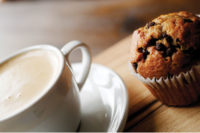Lower Fat to Lower Weight

Researchers from the University of East Anglia demonstrate that weight loss can happen without actively trying to lose weight beyond simply choosing foods lower in fat.
People taking part in trials also saw their waist-lines become slimmer, and levels of bad cholesterol decrease. The small but statistically significant reductions in cholesterols and blood pressure, suggest a beneficial effect on other major cardiovascular risk factors.
The research included results from 33 randomized controlled trials, in North America, Europe and New Zealand, involving 73,589 men, women and children.
Those taking part had varying states of health. Comparisons were made between those eating less fat than usual (intervention group) and those eating their usual amount of fat (control group). The effect on weight and waist line was measured after six months.
Eating less fat reduced body weight by 1.6kg, BMI by 0.56kg per square metre and waist circumference by 0.5cm.
All these effects were in trials in which weight loss was not the intended outcome, suggesting that they occur in people with normal diets. The weight loss happened quickly and was maintained over at least seven years.
"The weight reduction that we found when people ate less fat was remarkably consistent - we saw it in almost every trial. Those who cut down more on fat, lost more weight," said lead researcher Dr. Lee Hooper from UEA's Norwich Medical School.
"The effect isn't dramatic, like going on a diet. The research specifically looked at people who were cutting down on fat, but didn't aim to lose weight. So, they were continuing to consume a normal amount of food," Hooper said.
"What surprised us was that they did lose weight, their BMI decreased and their waists became slimmer. On top of this, they kept their weight down over at least seven years. There isn't a specific goal, the more fat you cut down, the more your weight falls," Hooper added.
"We didn't consider different types of fat in this study. However, cutting down on saturated fat reduces our risk of heart disease and strokes, so the healthiest way to cut down on fat is to cut down on saturated fats," Hooper said in a statement.
"This means having low fat milk and yogurt, cutting down on butter and cheese, and cutting the fat off meat. Most importantly have fruit instead of fatty snacks like biscuits, cake and crisps. And remember, this isn't a diet, so don't take it to extremes, but work out a way of eating that you can stick to permanently," Hooper advised.
Looking for a reprint of this article?
From high-res PDFs to custom plaques, order your copy today!




